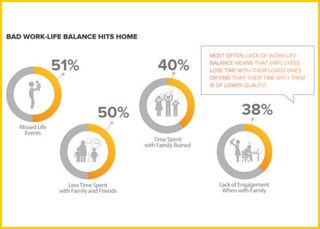Is Technology Destroying the Work-Life Balance?

Apparently, only 15% of employees definitively feel they suffer from a life-work imbalance.
I found that surprising. Most people I know complain of the opposite, myself included. So, I looked a little more closely at the pie chart in "The Work-Balance Report" released this week by Workfront, a developer of enterprise-wide work management solutions.
Of that 15%, only 4% "strongly disagree" with the statement "I believe I have a good work/life balance," with 11% saying they "somewhat disagree." On the flip side, just over a third -- 34% -- "strongly agree" with the statement, while more than half, 51%, "somewhat agree."
Essentially, that means 62% of employees somewhat experience a work-life imbalance. What is the difference, really, between "somewhat agree" and "somewhat disagree?" It's a bit like the difference beween "partly cloudy" and "partly sunny" in the weather report.
Workfront noted that technology-enabled employer intrusions on employees's free time are frequently behind the work-life imbalance.
Since the personal computer first began to creep into homes -- around the late 1980s/early 1990s -- this has been a topic of debate. Now, with constant access to email and corporate VPNs via our mobile devices and home computers, coupled with economic uncertainty and fears about job security, the debate has crescendoed.
It's worth looking back to find a way forward toward better balance.
A lot of early home PC adopters, aside from tech enthusiasts/hobbyists, were business professionals whose companies issued them, officially and unofficially, machines to take home.
On the official side, early "portable" computers -- "luggables" in actuality, like the now classic TRS-80 Model 100, which displayed four lines of text at a time -- enabled business travelers of the mid-to-late 80s to work from the road (and even upload files to the home-office mainframe via a built-in 300-baud modem and an acoustic coupler).
On the unofficial side, more than a few PCs were carted home by employees when their office PCs were upgraded, with IT looking the other way or unaware. It enabled you to sneak out of the office early or be a little late in the morning as long as you made up the time and delivered whatever was expected of you; you just recouped the time from home on your backdoor PC.
Over time, that renegade behavior helped open the door to employee demands for flexible work schedules, which in turn led to more official deployments of personal computers into employees' homes.
Today things have just about come full circle, with companies supporting "bring your own device" policies that allow employees to use their own smartphones, tablets, laptops and PCs to access corporate systems.
So, you could argue that, to at least some extent, we as employees helped start and have been complicit in this evolution toward the domination of work over our personal lives.
It's even reflected in the study, which found that although nearly 3 of 5 employees believe work-related texts and emails are killing the family dinner hour, 40% say replying to "urgent" messages during family dinners is "OK."
Once you overlook seemingly small intrusions (i.e., you answer the dinnertime texts), you're on a slippery slope.
The study found, for example, aside from tech-related intrusions, respondents reported that work had cut into their family time or diminished the quality of it; specifically, 51% reported work had caused them to miss major life events, 50% said they spent less time with family and friends because of work, 40% said family time had been ruined by work interruptions, and 38% said work caused a lack of engagement when they were with their families (see graphic).
The employees in the study -- conducted online in the U.S. Feb, 3-5 by Harris Polls among 2,016 adults ages 18 and older, among whom 610 werere employed full time in a typical 9-5 schedule -- didn't overtly blame technology for the work-life imbalance.
Just under a quarter (23%) of respondents cited "employee-issued devices that can't be turned off" and only 18% blamed "constant emails." But 39% listed "constantly working beyond standard business hours" as a top contributor to a lack of balance, and that often involves logging on to personal or company-issued devices from home.
Clearly, setting some personal boundaries is in order. While the aforementioned slippery slope toward a work-life imbalance may start with tech-enabled intrusions, employees should assess their own personal boundaries and employers should support those before they spiral out of control, Workfront found.
A whopping 60% of employees surveyed named "bad bosses" -- described as "demanding, overbearing, mean" as the biggest impediment to a work-life balance, and 89% said it's important for their employers to support their "off the clock" lives by not contacting them or referring clients to them after-hours.
"Those who fail to establish policies and expectations that support employee work-life balance should expect lower morale and productivity and higher turnover," Workfront said, noting that poor morale (68%), employee burnout and high turnover (tied at 41%), and poor productivity (36%) were the top workplace byproducts of a workforce suffering a work-life imbalance.
"On the other hand, those employers who succeed will reap a more engaged workforce and all the advantages that come with it," the company added.
To which I would also add, employees who set -- and stick by -- their own limits will feel more engaged at both home and work, and will reap all the benefits that come with that.
Multichannel Newsletter
The smarter way to stay on top of the multichannel video marketplace. Sign up below.
